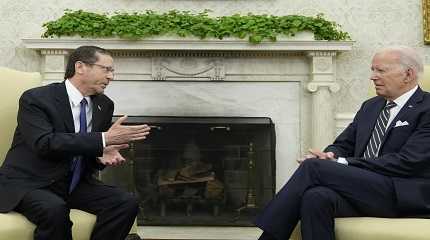
NEW YORK (AP) — Prime Minister Benjamin Netanyahu is set to have his long-coveted meeting with President Joe Biden on Wednesday — bringing together the two leaders for the first time since the Israeli leader took office at the helm of his country’s far-right government late last year.
Netanyahu has been a frequent visitor to the White House over the years, and Israeli leaders are typically invited within weeks of taking office. The lengthy delay in setting up the meeting with Biden and the White House decision to hold the meeting in New York rather than Washington have been widely interpreted in Israel as signs of U.S. displeasure with Netanyahu’s new government.
“Meeting at the White House symbolizes close relations and friendship and honor, and the denial of that shows exactly the opposite,” said Eytan Gilboa, an expert on U.S.-Israeli relations at Israel’s Bar-Ilan University.
“This is not going to be a pleasant meeting,” Gilboa said. “It is going to be a sour meeting.”
The White House was tight-lipped ahead of the Wednesday meeting, declining to offer much detail on what would be on Biden’s agenda for the talks.
Biden administration officials have repeatedly raised concerns about Netanyahu’s contentious plan to overhaul Israel’s judicial system, and the topic is sure to come up.
Netanyahu says the country’s unelected judges wield too much power over government decision-making. Critics say that by weakening the independent judiciary, Netanyahu is pushing the country toward authoritarian rule.
His plan has bitterly divided the nation and triggered months of mass protests against his government. Those protests have followed him to the U.S. Large numbers of Israeli expatriates are expected to protest outside Wednesday’s meeting in Manhattan on the sidelines of the U.N. General Assembly.
Early this year, Biden voiced his unhappiness over the overhaul, saying Netanyahu “cannot continue down this road” and urging the Israeli leader to find a compromise. Netanyahu’s negotiations with the Israeli opposition have stalled and his coalition has moved ahead with its plan, pushing the first major piece of the legislation through parliament in July.
The Israeli government’s treatment of the Palestinians has also drawn American ire. Netanyahu’s coalition is dominated by far-right ultranationalists who have greatly expanded Israeli settlement construction on occupied lands claimed by the Palestinians for a future state. Israel’s government also opposes a two-state solution between Israel and the Palestinians — a cornerstone of White House policy in the region. The deadlock has coincided with a spike in fighting in the West Bank.
The White House said Wednesday’s talks would focus on “shared democratic values between our two countries and a vision for a more stable and prosperous and integrated region.”
The meeting comes at a time of cooling ties between Israel and the Democratic Party. A poll by The Associated Press-NORC Center for Public Affairs Research found that while Americans generally view Israel as a partner or ally, many are questioning whether Netanyahu’s government shares American values. Republicans were significantly more likely than Democrats to call Israel an ally with shared values.
Tom Nides, who stepped down as U.S. ambassador to Israel in July, said the timing and location of Wednesday’s meeting were issues and acknowledged some policy differences.
“That’s what friends do. Friends argue with each other. We can articulate a strong view against settlement growth. We can say, quite frankly, arguably that they should get some compromise on judicial reform. What’s wrong with that?”
But he predicted a good meeting devoid of “fireworks,” noting that Biden and Netanyahu are longtime friends and the countries are still close allies. “The relationship is as strong as it has ever been,” he said.
Biden administration officials downplayed that the meeting is being held on the sidelines of New York, and not Washington. Netanyahu is expected to eventually get a White House invitation, though timing of such a visit could depend on how Wednesday’s meeting goes.
Topping Netanyahu’s wish list will be discussions on U.S. efforts to broker a deal establishing full diplomatic relations between Israel and Saudi Arabia.
Netanyahu, who also led Israel when former President Donald Trump brokered the “Abraham Accords” between Israel and four Arab countries, has said that a similar deal with Saudi Arabia would mark a “quantum leap” forward for Israel and the region.
The White House has acknowledged that it is seeking such a deal, but obstacles lie in the way. Saudi Arabia is pushing for a nuclear cooperation deal and defense guarantees from the U.S.
The Saudis have also said they expect Israel to make significant concessions to the Palestinians.
Biden is likely to make clear to Netanyahu that any deal will need to consider Palestinian interests. Biden is cognizant that the Saudis are wary of proceeding with normalizing relations with Israel at a time when it is led by the most right-wing government in its history, and when tensions have soared with the Palestinians.
The Saudi foreign minister, Prince Faisal bin Farhan, told reporters “there is no other way” to solve the conflict than by establishing a Palestinian state. But senior ministers in Netanyahu’s government have already ruled out any concessions to the Palestinians.
Israel is also eager to consult with the U.S. about Iran, particularly over their shared concerns about Iran’s nuclear program. Iran says the program is peaceful, but it now enriches uranium closer than ever to weapons-grade levels.
Danny Danon, a former Israeli ambassador to the U.N. who is now a lawmaker in Netanyahu’s Likud party, acknowledged that Wednesday’s meeting didn’t have the cachet of a White House visit.
“It doesn’t have the image and the ceremony,” he told Israel’s army radio station. Nonetheless, he said, “It’s a meaningful and very important meeting and we should be thankful it’s happening.”




